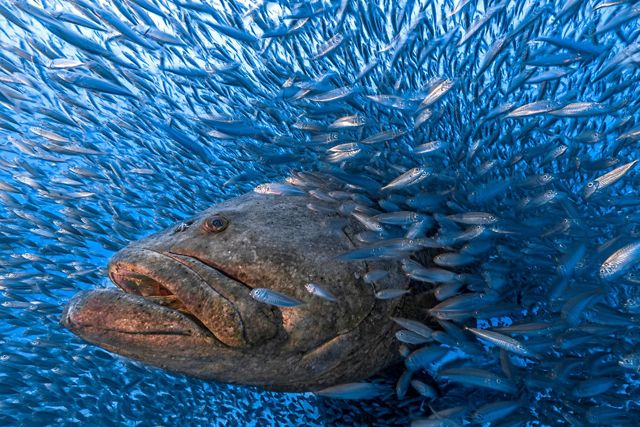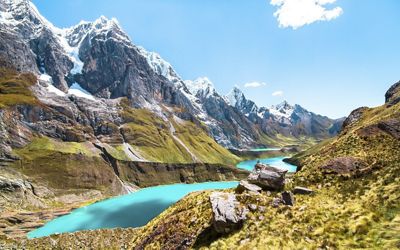
Nature Bonds Program: Unlocking Funds for Conservation and Climate Action
TNC’s Nature Bonds Program combines debt refinancing, science, planning and policy to help countries protect ecosystems and support communities.
Media Contacts
-
Rachel Winters
Deputy Director of Global Media Relations
Email: rwinters@tnc.org -
General Inquiries
Email: naturebonds@tnc.org
$1 Billion Unlocked for Nature
With the launch of our project in Ecuador, the six Nature Bonds projects now in implementation are expected to unlock approximately $1 billion for conservation, a monumental milestone. The projects will help to protect or improve the management of over 242 million hectares of ocean, land, and fresh water, and 18,000 km of rivers.
Ecosystems and natural resources around the world are under threat. The climate crisis and other pressures are accelerating biodiversity loss, worsening food and water insecurity, and leading to loss of lives and livelihoods. For many indebted countries, it’s a struggle to access the finances needed to protect communities and natural resources and address climate change, even when there is the ambition to do so.
As part of last year’s agreement on a Global Biodiversity Framework, governments have pledged to protect 30% of the world’s land, fresh water and oceans by 2030. It’s a landmark agreement that together with the Paris Climate Accord sets vital goals for people and nature. The more we protect and effectively manage nature, the more we can safeguard ecosystems that are critical to supporting the well-being of communities through benefits like increased climate resilience and improved food and water security. But that’s not all. Protecting nature at scale also helps the world in its battle to reduce carbon emissions and stem global warming. Forests and oceans soak up an estimated 11 gigatons of carbon each year—about a third of emissions from industry and fossil fuels annually.
Yet solutions are costly, and time is running out. The United Nations estimates the global gap in funding for biodiversity is $700 billion. And 88% of “last chance ecosystems” are in countries with moderate to high debt distress. For many countries, debt burdens and lack of access to international capital are enormous hurdles to meeting their ambitious biodiversity and climate goals. That’s where the Nature Bonds Program comes in.

Resources to Explore
A step-by-step guide designed for governments, partners and other stakeholders seeking a thorough understanding of the process, best practices and crucial considerations for world-class impact. Download pdf here.

Belize Blue Bonds for Ocean Conservation Impact Report
Learn more about The Nature Conservancy's Belize sovereign debt conversion in the latest annual Impact Report.
Our History
For more than 70 years, The Nature Conservancy has been pioneering initiatives to protect nature, with sustainable financing a core element of our work. Piloted in Seychelles in 2016, our approach—initially dubbed Blue Bonds for Ocean Conservation—that combines debt refinancing with technical assistance has proven highly effective. Recently expanded to include terrestrial and freshwater outcomes, what we now call our Nature Bonds Program has six projects in implementation, including marine-focused projects in Barbados (2022), Gabon (2023), and The Bahamas (2024), and the program's first ever project focused on terrestrial and freshwater conservation in Ecuador (2024). Together, the six projects are expected to generate approximately USD $1 billion in conservation funding and support governments to reach new protection commitments or improved management of approximately 242 million hectares of ocean, land, lakes and wetlands and 18,000 km of rivers, demonstrating how quickly this approach is scaling around the world.
What Is the Nature Bonds Program?
The Nature Bonds Program is a holistic approach to leverage debt refinancing for effective, durable conservation and climate action. We work with governments to help them refinance debt and generate new funding to invest in conservation, and in climate mitigation and adaptation measures. Once the transaction closes, we partner with national governments to make direct conservation investments over the span of 15 to 20 years to implement robust conservation plans. For each Nature Bonds project, TNC acts as a long-term partner, providing guidance and support to countries throughout the project term.
Download the Nature Bonds Toolkit
A step-by-step guide to the Nature Bonds approach, designed for governments, partners and other stakeholders seeking a thorough understanding of the process, best practices and crucial considerations for world-class impact.
Quote: Jennifer Morris
With strong partnerships and collaboration between governments, funders and multilateral development banks, the Nature Bonds Program is helping countries refinance debt and re-invest the savings in nature conservation and climate action.
Powered by Partnerships
Nature Bonds projects combine debt refinancing, science, policy and planning to support countries in achieving their conservation and climate goals, close the nature finance gap, and support local communities.
To make Nature Bonds projects possible, TNC engages with governments, financial institutions, NGO partners and community stakeholders to ensure that the project outcomes are a win for both nature protection and sound fiscal management.
The Nature Bonds Program builds on our experience with Blue Bonds projects in Seychelles, Belize, Barbados and Gabon. Our project in Barbados is one example of the deep collaboration behind our holistic approach to leveraging debt refinancing for action on conservation and climate priorities. We worked with the Barbadian government under Prime Minister Mia Mottley, partners from the financial and conservation spheres, and communities to develop a set of commitments for durable conservation that is tailored to Barbados.

TNC will be working in Barbados with stakeholders like fishers, with the tourism sector and with communities and local NGOs on marine spatial planning to design marine protections and management plans that balance conservation and the development of a sustainable Blue Economy. Launching the project in 2022, we worked with the InterAmerican Development Bank, Credit Suisse and CIBC First Caribbean Bank to secure new funds through a $150 million debt refinancing that is expected to channel $50 million to marine conservation over a period of 15 years and help achieve lasting benefits to nature and the local economy. By replicating projects like this, the Nature Bonds Program is committed to ensuring financing for conservation and climate adaptation and mitigation not just in the immediate future but over the long term.
Such innovative approaches require financial resources to get off the ground, and all our work is made possible by philanthropic support that enables us to develop new debt transaction projects and offer countries tailored science, policy and planning support to deliver effective and durable conservation outcomes.

Communities—Communities have a vital role to play in the development and implementation of Nature Bonds projects. In the Seychelles, more than 100 stakeholders were consulted during the preparation of the country’s Marine Spatial Plan, which supports the sustainable development of the Seychelles Blue Economy through activities such as fishing, tourism and more while ensuring that marine environments and ecosystems and community livelihoods are protected.
Country leaders and policymakers—Political leaders around the world are making important new commitments on funding, conservation and addressing the climate crisis. Nature Bonds projects rely on their leadership and ambition to deliver on pledges. The government of Belize is essential to the success of a Blue Bond project that will protect 30% of the country's oceans. Belizean Prime Minister John Briceño said that “Blue Bonds will help us support the vibrant marine life that reside here and maintain the rich biodiversity that is crucial for the health of our ecosystem and the planet. We are proud to be pioneers in this work and to lead the way for other countries to join us as we conserve our oceans for Belize and beyond.”
Philanthropic partners—Support from our philanthropic partners and the involvement of other funders help us provide the expert advice and convening power that underpin Blue Bonds and Nature Bonds projects. Funders also support TNC’s in-country staff, who play a key role in seeing our rigorous conservation projects through from start to finish.
Financial partners—Nature Bonds projects are made possible by the support of multilateral development banks as well as other financial partners who provide credit enhancements that allow countries to access the best outcomes and offer expert advice. In Gabon, we collaborated with the US Development Finance Corporation (DFC) to develop a debt refinancing and conservation program that met Gabon’s needs and ambitions. DFC CEO Scott Nathan explained, “DFC’s political risk insurance provided critical support for this historic transaction, helping to mobilize capital from institutional investors and catalyze additional investment in Gabon’s marine conservation efforts.”

Now Is the Time for Action
We must act now to preserve nature, accelerate action on climate adaptation and mitigation and biodiversity conservation pledges at the national and international level, and support the well-being of communities and ecosystems around the world. Global movements such as the Nairobi Declaration are also adding their voices to the call for urgent climate finance action, and Nature Bonds projects will work in cooperation alongside these types of initiatives as a part of the growing global movement for urgent action on the biodiversity loss and climate crises.
Nature Bonds projects are an exciting path to support countries in financing and accelerating projects that move the world toward reaching global biodiversity and climate commitments—but more ambition, funding and partnerships are needed to help them achieve maximum impact.
Debt refinancing is a key tool for unlocking new funds and addressing the nature and climate finance gaps, and we hope new partners will join efforts to accelerate action on climate adaptation and mitigation and conservation.
Global Insights
Check out our latest thinking and real-world solutions to some of the most complex challenges facing people and the planet today.



